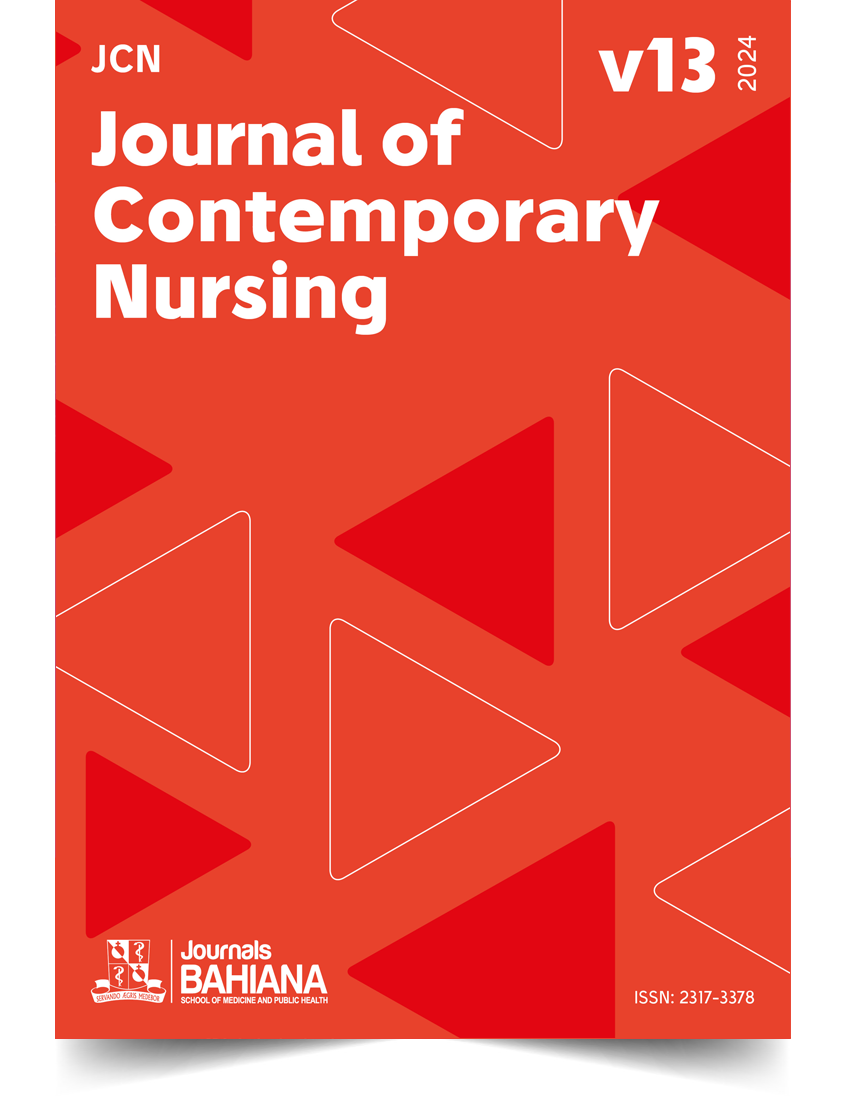The importance of inserting the father in prenatal consultations
DOI:
https://doi.org/10.17267/2317-3378rec.2024.e5301Keywords:
Prenatal care, Paternity, PregnancyAbstract
OBJECTIVE: To describe the perception of parents, pregnant women, and nurses about paternal prenatal consultation. METHOD: Descriptive exploratory research with a qualitative and quantitative approach. Thirty-two fathers and 32 mothers participated in the research, in addition to four nurses, through semi-structured interviews carried out in Basic Health Units. To analyze the qualitative content, descriptive techniques and thematic analysis were used, for the quantitative approach, a percentage calculation was carried out. The research was approved by the Ethics Committee. RESULTS: Three categories were created, the first being parental participation in prenatal care, in which it was identified that 97% of parents are interested in participating in consultations; however, 65% report that pregnancy is the woman's responsibility. The second category is the importance of fathers’ participation from the pregnant woman's perspective, in which 72% report not knowing about male participation in consultations and that their partners never attended, and 84% said they encouraged male participation. The third category is the nurse's approach to including the father in prenatal care, demonstrating that 100% of nurses say they are prepared to receive men, 75% report encouraging participation, and 50% say that fathers do not show interest in attending the consultations. CONCLUSION: It was evident that fathers are interested in paternal prenatal care and that they need greater encouragement from nurses.
Downloads
References
(1) Paiz JC, Ziegelmann PK, Martins ACM, Giugliani ERJ, Giugliani C. Factors associated with women’s satisfaction with prenatal care in Porto Alegre, Rio Grande do Sul, Brazil. Ciênc Saúde Coletiva. 2021;26(8):3041-51. http://doi.org/10.1590/1413-81232021268.15302020
(2) Sousa SC, Oliveira FBM, Sousa FCA, Silva SS, Silva WC, Lima KLA et al. Prenatal assistance: father's participation in healthy pregnancy. Res Soc Dev. 2021;10(1):e14710111330. http://dx.doi.org/10.33448/rsd-v10i1.11330
(3) Almeida DCS, Fettermann FA, Cortes LF, Sehnem GD, Donaduzzi DSS. Strategies used by nurses to stimulate the participation of the father/partner in the pre-christmas. Recima21. 2021;2(8):e28608. https://doi.org/10.47820/recima21.v2i8.608
(4) Schettini ES, Amaral EMN, Leal RO. Satisfaction of Health Users in Front of the Family and Reproductive Planning Program. Rev Saúde em Foco. 2021;8(2):15-27. http://dx.doi.org/10.12819/rsf.2021.8.2.2
(5) Santos EM, Ferreira VB. Pré-natal masculino: significados para homens que irão (re)experienciar a paternidade. Unifunec Cient Mult. 2016;5(7):62-78. http://doi.org/10.24980/rfcm.v5i7.2338
(6) Walsh TB, Carpenter E, Costanzo MA, Howard L, Reynders R. Present as a partner and a parent: Mothers' and fathers' perspectives on father participation in prenatal care. Infant Ment Health J. 2021;42(3):386-99. http://doi.org/10.1002/imhj.21920
(7) Centeno, SR. As representações de sujeito na Política Nacional de Saúde Integral da População Negra (PNSIPN): uma abordagem de gênero e raça/cor [dissertation] [Internet]. Porto Alegre: Universidade Federal do Rio Grande do Sul; 2016. Available from: https://lume.ufrgs.br/handle/10183/143212
(8) Ministério da Saúde (Brasil), Secretaria de Atenção à Saúde, Departamento de Ações Programáticas Estratégicas, Coordenação Nacional de Saúde do Homem. Guia do Pré-Natal do Parceiro para Profissionais de Saúde. [Internet]. Brasília: Ministério da Saúde; 2016. Available from: https://portal.saude.pe.gov.br/sites/portal.saude.pe.gov.br/files/guia_prenataldoparceiro_1.pdf
(9) Lima KSV, Carvalho MMB, Lima TMC, Alencar DC, Sousa AR, Pereira A. Father's participation in prenatal care and childbirth: contributions of nurses' interventions. Invest Educ Enferm. 2021;39(2):e13. https://doi.org/10.17533/udea.iee.v39n2e13
(10) Palioura Z, Sarantaki A, Antoniou E, Iliadou M, Dagla M. Fathers' Educational Needs Assessment in Relation to Their Participation in Perinatal Care: A Systematic Review. Healthcare. 2023;11(2):200. https://doi.org/10.3390/healthcare11020200
(11) Schneider EM, Fujii RAX, Corazza MJ. Quali-quantitative research: contributions to research in science teaching. Rev. Pesq Qual [Internet]. 2017;5(9):569-84. Available from: https://editora.sepq.org.br/index.php/rpq/article/view/157
(12) Fontelles MJ, Simões MG, Almeida JC, Fontelles RGS. Scientific research methodology: guidelines for size sample calculation. Rev Para Med [Internet]. 2010;24(2):57-64. Disponível em: https://pesquisa.bvsalud.org/portal/resource/pt/lil-593646
(13) Rosa LS, Mackedanz LF. Thematic analysis as a methodology in qualitative research in science education. Atos de Pesquisa em Educação. 2021;16:e-8574. http://dx.doi.org/10.7867/1809-0354202116e8574
(14) Trindade Z, Cortez MB, Dornelas K, Santos M. First-time fathers: demand for support and visibility. Saude Soc. 2019;28(1):250-61. http://doi.org/10.1590/S0104-12902019170892
(15) Dutra BSS, Correia GS, Torres LO, Nunes JSS. Barreiras à inclusão paterna no pré-natal. Pesquisa, Sociedade e Desenvolvimento. 2022;16(1):e369111638501. Disponível em: https://rsdjournal.org/index.php/rsd/article/view/38501.
(16) Davis J, Vaughan C, Nankinga J, Davidson L, Kigodi H, Alalo E, et al. Expectant fathers’ participation in antenatal care services in Papua New Guinea: a qualitative inquiry. BMC Pregnancy Childbirth. 2018;18(1):138. http://doi.org/10.1186/s12884-018-1759-4
(17) Rodrigues LFO, Francês LCM. Evolução do conceito de dignidade da pessoa humana e repercussões jurídicas: uma discussão a partir da união estável homoafetiva feminina e o advento da" gestação compartilhada". Rev do Curso de Direito da Uniabeu [Internet]. 2019;12(1):68-82. Available from: https://revista.uniabeu.edu.br/index.php/rcd/article/view/3638
(18) Holanda SM, Castro RCMB, Aquin PS, Pinheiro AKB, Lopes LG, Martins ES. Influence of the partner’s participation in the prenatal care: satisfaction of primiparous women regarding the support in labor. Texto Contexto Enferm. 2018;27(2):e3800016. https://doi.org/10.1590/0104-070720180003800016
(19) Firouzan V, Noroozi M, Farajzadegan Z, Mirghafourvand M. Barriers to men’s participation in perinatal care: a qualitative study in Iran. BMC Pregnancy Childbirth. 2019;19(1):45. https://doi.org/10.1186/s12884-019-2201-2
(20) Silva GS, Silva ACF, Viana MRP. Paternal participation in prenatal and women’s health. Res Soc Dev. 2020;9(7):e894975042. http://doi.org/10.33448/rsd-v9i7.5042
(21) Sousa AR, Oliveira JA, Almeida MS, Pereira A, Almeida ES, Escobar OJB. Implementation of the National Policy for Comprehensive Attention to Men’s Health: challenges experienced by nurses. Rev Esc Enferm USP. 2021;55:e03759. https://doi.org/10.1590/S1980-220X2020023603759
(22) Santos NNS, Silva KB, Costa DC, Ferraz VHG, Carvalho ALS, Tavares MR, et al. Strategies of nurses in stimulating active paternity in prenatal. Res Soc Dev. 2019;9(7):e673974579. http://dx.doi.org/10.33448/rsd-v9i7.4579
(23) Ampim GA, Blystad A, Kpoor A, Haukanes H. “I came to escort someone”: Men’s experiences of antenatal care services in urban Ghana—a qualitative study”. Reprod Health. 2021;18(1):106. https://doi.org/10.1186/s12978-021-01152-5
Downloads
Published
Issue
Section
License
Copyright (c) 2024 Fabiana Rezer, Wladimir Rodrigues Faustino

This work is licensed under a Creative Commons Attribution 4.0 International License.
This work is licensed under a Creative Commons Attribution 4.0 International License.



